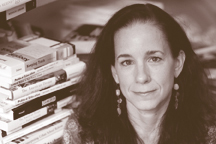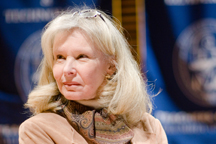Learning What We Know About Equity
From its inception, The Campaign for Educational Equity was intended as a vehicle that would bring together the diverse expertise at Teachers College and focus it on the wide range of issues that bear on the nation's education achievement gap.
Now that vision has moved another step closer to becoming a reality, as more than 15 TC faculty members have signed on to review existing knowledge and knowledge gaps in The Campaign's 12 priority research areas.
"The central purpose of this work is to thoughtfully and thoroughly investigate what we know from existing social science research on comprehensive educational approaches to education for low-income children of color," says Amy Stuart Wells, Professor of Sociology and Education, who in October was named to head The Campaign's Research Initiative. "The next step will be to fill the gaps in that literature with comprehensive research projects that draw on the wide range of expertise within the TC faculty."
The first paper - on high quality early childhood education programs - was published in November by Sharon Lynn Kagan, TC's Virginia and Leonard Marx Professor of Early Childhood Policy. Titled "American Early Childhood Education - Preventing or Perpetuating Inequity?", it found that early childhood services must not only be expanded, but systematically reformed to meet the needs of the most at-risk students. Otherwise, Kagan argued, programs will only reproduce existing disparities in the system.
The Campaign's other priority research areas - and the TC faculty and affilitated staff members (and faculty from other institutions) who will review them - are:
-
Rigorous and challenging curricula for all students: Margaret Crocco and Anand Marri
-
High quality teaching: Michelle Knight and Thomas Hatch
-
Effective, sustained educational leadership: Carolyn Riehl
-
Appropriate class size: Douglas Ready
-
Appropriate Academic Support for English Language Learners: Ofelia Gracia and JoAnne Kleifgen
-
Appropriate Physical and Mental Health Care Services: Charles Basch
-
Appropriate Academic Support for Special Education Students: Margaret McLaughlin (University of Maryland)
-
Appropriate Academic Support for Children in Areas of Concentrated Poverty: Amy Stuart Wells, Craig Richards
-
Effective After-School , Community and Summer Programs: Jeanne Brooks-Gunn, Jodi Roth, Margo Gardner
-
Effective Parent Involvement and Family Support: Edmund Gordon, Beatrice Bridglall, Heather Weiss (Harvard University)
"These are some of the top people in their respective fields," says Michael Rebell, The Campaign's Executive Director. "When these reviews are completed and published in print and on The Campaign's Web site, The Campaign will in effect offer one-stop shopping for state-of-the-art knowledge about the most essential equity-related issues."
Published Monday, Feb. 26, 2007

